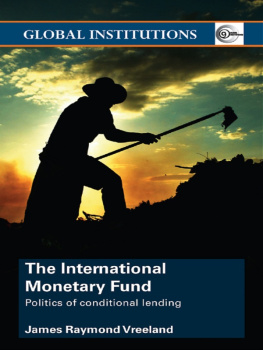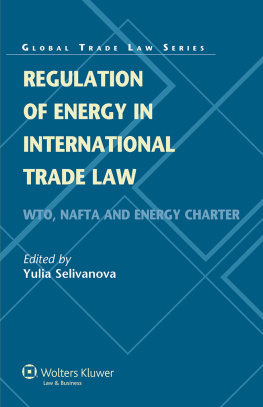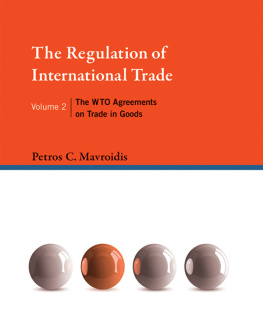The Politics of International Telecommunications Regulation
The Politics of International Telecommunications Regulation
James G. Savage
First published 1989 by Westview Press
Published 2019 by Routledge
52 Vanderbilt Avenue, New York, NY 10017
2 Park Square, Milton Park, Abingdon, Oxon OX14 4RN
Routledge is an imprint of the Taylor & Francis Group, an informa business
Copyright 1989 by Taylor & Francis
All rights reserved. No part of this book may be reprinted or reproduced or utilised in any form or by any electronic, mechanical, or other means, now known or hereafter invented, including photocopying and recording, or in any information storage or retrieval system, without permission in writing from the publishers.
Notice:
Product or corporate names may be trademarks or registered trademarks, and are used only for identification and explanation without intent to infringe.
Library of Congress Cataloging-in-Publication Data
Savage, James G., 1963
The politics of international telecommunications regulation / by
James G. Savage.
p. cm.
Includes index.
ISBN 0-8133-7682-3
1. International Telecommunication Union. 2. Telecommunication
International cooperationPolitical aspects. I. Title.
HE7700.S28 1989
384'.041dc19 88-20564
CIP
ISBN 13: 978-0-367-29512-7 (hbk)
Many individuals and organizations have provided invaluable assistance to me in the research and writing of this book. To my mentor, adviser, editor, and friend, Professor Mark W. Zacher, Director, Institute of International Relations, University of British Columbia, I offer my deepest and most sincere thanks. Without Mark's generous support and confidence, this project would never have become a reality.
Several individuals were especially helpful to me in providing insights, opportunities, and comments. I would particularly like to thank Ed DuCharme of the Department of Communications, Canada; Gary Brooks, International Frequency Registration Board (IFRB), Geneva; and Arnold Matthey, formerly of the IFRB and a veteran of the International Telecommunication Union (ITU). I have also benefited from the information and insights obtained from the following people: in OttawaGaby Warren, Don Fraser, John Gilbert, Keith Hoffmann, Robert Jones, Jeffrey Crelinsten, and Vernon MacDonald; in MontrealPaul Morneault, Andre Vermette, Ian MacFarland, and Ram Jakhu; and in Washington, D.C.-Don Abelson, Doug Davis, Michael Gardner, Domenick Iacovo, Harold Kimball, Lawrence Palmer, Anthony Rutkowski, and Kalmann Schaefer. Much assistance was also received from many people at the ITU in Geneva and from several organizations here in London.
For their generous financial assistance, I am deeply indebted to the Institute of International Relations, University of British Columbia; the Donner Canadian Foundation; and the Department of Communications, Canada. I would also like to thank Gaby Warren at the Department of Communications for permitting me the unique opportunity of attending, within the Canadian delegation, the 1987 ITU World Administrative Radio Conference for the Planning of the High Frequency Bands Allocated to the Broadcasting Service. Here in London, my employer, the International Institute of Communications, has shown unusual understanding in granting me time and the use of facilities in completing this work.
I am indebted to my friends in Vancouver and London for many happy times associated with the period spent on this project. Finally, I reserve special thanks for my parents, whose encouragement, faith, and support could not have been greater.
James G. Savage
London
If trade is the life blood of an economy, then telecommunications can truly be regarded as the nervous system of both the economy and society.
C.R. Dickerson
What is telecommunications? This word, used by all of us in everyday speech, in fact lacks any clear meaning. The International Telecommunication Union (ITU), the UN specialized agency empowered to oversee telecommunications regulation, has struggled through the 1970s and 1980s attempting to forge an acceptable definition.
Telecommunications comprises all aspects of voice and data transmission by radio, television, wire, microwave, and satellite. To people in the industry there is a sharp distinction between "telecommunications" (referring to all two-way services such as telephony, data traffic, etc.) and "broadcast communications" (such as radio and television). At both the national and international level, "telecoms" and broadcasting are subject to the same regulatory frameworks. But any umbrella definition of telecommunications must consider that "there are no two things in the universe that are more different to each other in their pure states than broadcasting and telecommunications. One of them is all content with a minimum degree of carriage, the other is all carriage with no content.... We are under an overriding disability when we come to talk about both broadcasting and telecommunications ... in that the arguments, issues and concerns that apply to the one will almost never apply to the other."
Having said that, the 1980s have also seen the emergence of what has come to be termed the "convergence" of the new technologies of telecommunications and broadcasting. This trend started with cable television and has evolved into broadband systems, fiber optics, satellite delivery means, and so forth. The boundary lines demarcating "telecom" services, broadcast services, and, indeed, certain computer technologies are no longer that distinct. Broadcasters will be able to provide data services and telephone carriers will be able to provide radio and television services. To an extent, this is already happening.
The pace of change and the boundaries of change are now unprecedented. Regulatory structures must encompassalbeit flexiblythese high velocity changes to telecoms and broadcasting.
For the purposes of this volume, telecommunications will comprise both "telecoms" and broadcasting. In other words, telecommunications is everything within the purview of the International Telecommunication Union.
This book seeks to explain the ITU arid its central role in the politics of international telecommunications. It focuses on the key areas of frequency spectrum allocation, the avoidance of deliberate interference, and the setting of international telecommunications standards. These areas are all vital to the operation of the international economy. The ability of the ITU to facilitate international communications has a direct and immediate impact on every aspect of political economy. The ITU oversees international telecommunications which, however one defines it, is at the heart of all aspects of the modern economy and polity. Nothing is more central to the economic and political infrastructures of daily life.
The origins of international telecommunications, and the speed with which these technologies became central to our lives, must be noted in any attempt to understand how telecommunications are governed today. Telegraphy originated with the experiments of Morse and Wheatstone in the 1830s. Within twenty years telegraphy had grown rapidly and pervasively across Europe and North America. International telegraphy became possible on both continents (though not between them) by 1850.








